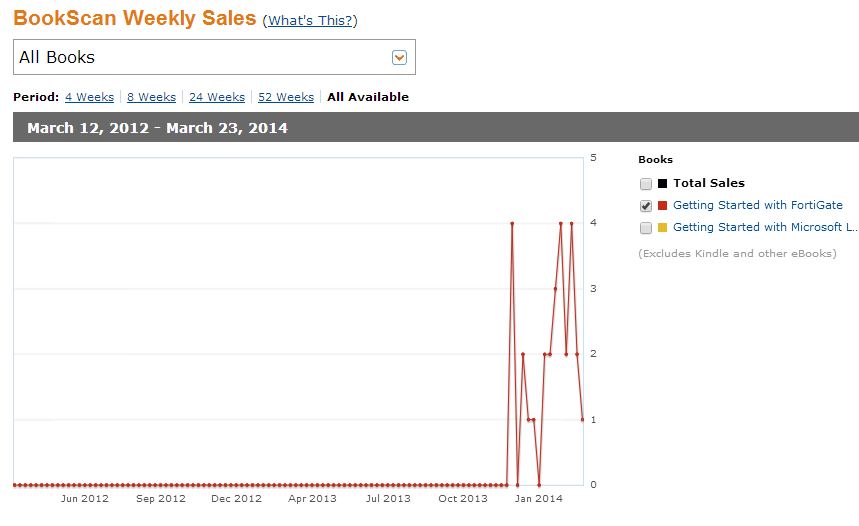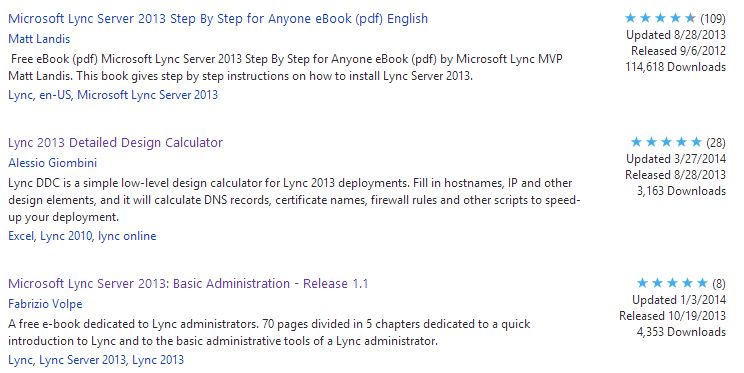Disclaimer: during the last two years I wrote a good number of technical book and I am still working on new ones. So what I will write here comes from my experience, and is not intended to discourage other people from writing. Also everything I will write here may be not true for everyone.
I don’t know how it was to write an IT dedicated book a few years ago. I have begun to write a couple of years ago. What I will share with you are some lessons that I learned the hard way, hoping that they will help you in evaluating the downsides of publishing and IT oriented book in 2014 (and to better understand what book authors live and do)
Contents Expiration
As you know, a specific version of a software (including operating systems) now is flanked (replaced?) by the next release in a year. There may be exceptions but they are often in a direction that is the opposite to the one that you could desire when writing a book (i.e. the version you are using lasts less than one year). Service packs and updates are made available often and they may change the available features and the way a product works in a dramatic manner.
This information has a tremendous impact on your work, because your objective is to publish something that is in line with the most recently available release. This means that while you are proofreading or editing a chapter, you could have to rewrite it for a large part.
Not less important, the contents of your book will be “old” in a year (if you are lucky) reducing the timeframe in which it is able to sell the most. If you are lucky, maybe you have access to an early – beta version of the product but, anyway, you take the risk of working on a version that could be really different from the RTM – final one.
Note: the aforementioned situation happens also with hardware. Usually this kind of solution changes less often than software but, anyway, the rate of change for those products is high too.
Piracy
If you have read in the news the recent decision that Getty Images took about its own contents you have for sure understood that fighting piracy on the Internet is like putting a finger in the dike. Publishers know it better than you, so don’t expect to have any useful help from them, when you identify some site – torrent – whatever that is giving away your work for free. If you have ever used an image or a content without paying the maker, think to it as balancing Karma 🙂
Anyway, piracy is going to have perceptible consequences on you book’s revenues.
I made a quick Google search for my one of my own books “Getting Started with Microsoft Lync Server 2013” and easily found sites like this one.
Now, if 10% of the people that “viewed” the page have downloaded the book, I have 50 less copies sold. And this is a single site
P.S. I’ve tested it and it works, so now I have a pirate copy of my own book, including a .epub version 😀
Revenues
For sure, I don’t know the way ALL the publishers deal with their authors, but talking with people that have worked with different companies, I can share with you my idea. The money you gain is (obviously) tied to the copies that you are able to sell. Usually the publisher will give you advances of the future gains, to encourage you in finishing your job. The advances may be managed in various manner, usually they are based on the delivery and acceptation of a part of your book. You can trust me if I say that often, when you are writing, you will need some kind of incentive to go on with the work. Anyway, your gain will be a percentage (let’s say something between 10% and 16%) of the money the publisher will make from your book. Printed copies will be more profitable, but there will be also a lot of ways to sell your book (like third party sellers, subscriptions and so on) that will lower your gains.
In the Publisher We Trust
So, everything will move around the number of copies you have sold. And here begins the funnier part. You will have NO clear idea of how many copies you are selling. For sure, your publisher will send to you a “royalties statement” but you will have no hard data to say if the numbers are really what they have to be. The only seller that gives you something like an information is Amazon, with its ranking system (and the author’s central site). Amazon ranking gives no direct information on the copies you are selling, however many people have been able to translate it on sold copies. I use Novelrank, a free service that gives to me data about my books (and books other people have wrote) based on Amazon ranking. Please remember that the ranking is also different on the various sites Amazon uses around the World so, for example, an hig ranking on Amazon.it is really not important as one on Amazon.com
Here you can see the results I have for another book of mine, “Getting Started with FortiGate” published on November 25, 2013
If you are interested, the estimate is over 50 copies sold this year.
The aforementioned evaluation is based on the ranking for the Kindle edition. So, what about the printed copies ? Well, if you are the author of the book, you are able to register on Amazon’s Author Central and see how many useful information, including the printed copies you have sold (again, “Getting Started with FortiGate” will be used as an example)
If you are interested also to this information, it is something like 24 printed copies sold in the U.S.
Note: Author Central is available also for Amazon.co.uk, but it will give you less information
And that’s all. The copies sold outside Amazon (and the printed copies not sold from Amazon.com) are something that you will know only through the publisher.
Bad Reputation
Now, let’s say that you wrote a really good book and you received a positive feedback from tech reviewers, professional peers and readers. You may thing that you have avoided one of the big risks related to writing a book (i.e. writing something that is not good as it seems). Well, things are not exactly this way. I will state my case but I know a few authors that have received what looks like “targeted” negative reviews, to lower the reputation of their book on Amazon (but it is a problem that you may extend to the Internet in general).
On March 3 the Sun was bright and I was thinking my own business, when I received this review from a guy called “Cranky Buddha” (really)
I have many reasons to think that this review is not exactly a fair one but, anyway, here it is. One star, negative review lowering the reputation of a work you have done (and that received a really good feedback so far). Again there is nothing that you (or the publisher) can fight this kind of situation.
What About Positive Feedbacks?
I had many of them, and usually they are the main reason that will give you the will to publish your contents (and this is a good reason also for blogging, for example). Having the feeling that your work is helping other people is a good incentive. But, also here, keep in mind that the quantity and quality of positive answers to your work may be not the one you expect. Let’s take a look to three free works me, Alessio Giombini and Matt Landis have published on the TechNet Office Gallery (they are the top 3 for popularity)
As you can see in the image, there is a big difference between the number of downloads and the “stars” the works have received. It’s hard to understand why people that are using your work for free do not feel the need to rate it in a positive manner (114,618 Downloads and only 109 ratings… unbelievable).
How Much Time do You Need to Write?
The answer, here, will differ a lot from author to author. Usually it requires to me one hour to write a book page (it’s an average speed calculation). I know people that are able to write more than 100 pages in a month. Anyway, add to the aforementioned work the rewriting of contents after tech review and proofreading, the time required before and after the book is published (preparing the table of contents, summarize the book topics) and so on.
How Much do You Gain?
There is no fixed law, but we can try to play with numbers. Let’s say that a book containing 200 pages requires 100 hours of work for a fast author and that he is able to write them in 2 months. Add 1 month for the reviews and for the publication. After 3 months your book is ready. We can imagine that the Kindle copy will cost around 25$ and that your royalties are 15%. If you sell 500 copies (a good result) your gain will be 1875$. That makes 18,75$ for every hour you dedicated to your book including taxes (and please remember that we are supposing you are really fast in writing and that the book is a good seller).
Final Thoughts
I am sure that if you have an idea for a cool book or if you will be offered the opportunity to write a book you will take it. That’s what I do and I have no regret. The aforementioned list of issues is just to help you in understanding that also an interesting work like writing will have a dark side. Probably if you have a passion for writing you will keep on authoring books like I do, but with a little less wrong ideas than the ones I had a few years ago 🙂







